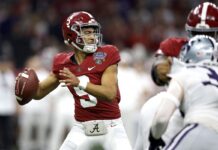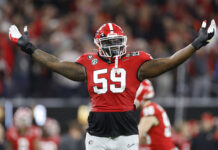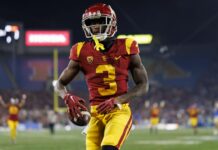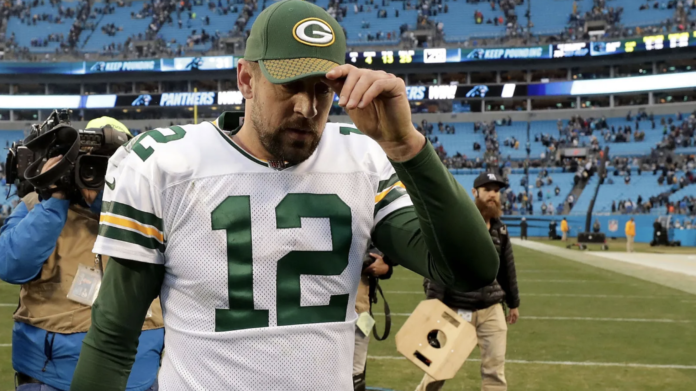On January 24, 2021, the Green Bay Packers took on the Tampa Bay Buccaneers in the NFC Championship game to represent the NFC in Super Bowl LV. The Packers went into the game fielding their best team since the 2011 season, a 15-1 season that saw the team eliminated in the Divisional Round after a 37-20 home loss to the New York Giants. That season felt all too similar to 2020, as Rodgers lit up the league to the tune of a 122.5 passer rating in 2011, won the MVP award, and manned one of the most potent offensive units in NFL history. The NFC Championship bout with Tom Brady and the Buccaneers exemplified the very issues that have plagued the Packers in big playoff games for years. It was another game that felt needed to be perfect for the Packers to win. The Packers’ defense picked off Brady a whopping three times in the second half, led by creative pressure packages that forced Brady into poor decisions and quick releases of the football. It was the Packers’ first home NFC championship game in the Rodgers era, another factor in the Packers’ favor that gave them hopes of reaching Super Bowl LV. While many factors lined up nicely for the Packers to defeat the Buccaneers at home and reach the Super Bowl, the Packers got plagued by the same issues that have plagued them in past NFC Championship games.
With the Buccaneers at the Packers’ 39-yard line with 8 seconds before the half, the Packers were looking to keep the Buccaneers there for a 56-yard Field Goal. However, little-known WR Scotty Miller ran a deep route to the end zone, managing to get by starting Outside Cornerback Kevin King for a Touchdown to take a 21-10 lead at halftime. Later in the game, Wide Receiver Equanimeous St. Brown dropped a Two-Point Conversion pass that hit his chest after the Packers scored a momentum-swinging Touchdown in the second half. The series of gaffes and an inability to slow down the Buccaneers’ pass rush led to a fourth NFC Championship game loss in the Rodgers era since 2010. There has been a common theme in these big games, and it seems like the team and Rodgers must play perfectly to win. Even though Rodgers won the Quarterback turnover battle after throwing one Interception to Brady’s three, a significant determinant in playoff football, the team could not win the game. The Championship game loss led to Rodgers’ postgame press conference comments, in which he spewed uncertainty regarding his future with the franchise. The presser was a red flag for Packers fans, considering how successful the team was this season and the fact that Rodgers is under contract through 2023. These events would set the stage for a gloomy, tumultuous offseason.
On April 29, 2021, as the NFL world waited for the First Round of the draft to happen, Adam Schefter released a report regarding the star Quarterback’s future with the organization. The report stated Rodgers sought a trade out of Green Bay due to unhappiness with the front office and General Manager Brian Gutekunst. The report came precisely one year after the 2020 draft, in which the Packers traded up four spots to select Utah State Quarterback Jordan Love. The move was undoubtedly controversial after the Packers reached the NFC Championship game that season. After a 37-20 loss that was not as close as the scoreboard suggests, the NFL world was perplexed to see Gutekunst select a high-upside talent who needed a season or two to develop before playing. The move indicated to Rodgers, and the NFL world, that the Packers viewed Rodgers as an expensive, aging star. Draft night was the beginning of the rumors circulating regarding Rodgers’ relationship with the franchise, as well as his playing future.
To make matters worse, Rodgers has not released a public statement detailing his gripe with the Packers or what he wants to remain with the team. Rodgers’ silence has kept the league and its fans guessing. Was it the Packers’ lack of commitment to Rodgers through contractual terms? Was it the team’s selection of a young, talented player at his position after the team reached the NFC Championship? Nobody truly knows, except Rodgers himself. The Packers’ organizational philosophy has been consistent for decades. Team President Mark Murphy has kept a rigid organizational structure that has helped maintain order, efficiency, and long-term success. The structure is based upon rigidity, one in which players are treated as employees and are not asked for their opinion on roster moves. The organization is built on the idea that long-term success comes from a consistent culture where players focus on playing, coaches focus on coaching (and do not have a significant say in personnel decisions), and the personnel department handles the roster. The Packers have operated this way for decades, and it has been the main reason behind their 293-169 record since Brett Favre took over as the starter in 1992. With player-team relations changing over time, and star players having more leverage than they ever have before, many have wondered whether the Packers’ rigidity would rub star players like Rodgers the wrong way. Many have speculated that Rodgers’ gripe with the team is the front office’s lack of consideration for his preferences as the star Quarterback. The Packers’ rigid front office structure does not allow players to influence personnel decisions. Rodgers seems to resent the organization’s attitude, as he has been the catalyst for the team’s success ever since he took over as the starter in 2008.
When taking a closer look at the Packers’ playoff runs and their history in the NFC Championship game, one can see why a Quarterback the caliber of Rodgers would voice frustration. The Packers’ first NFC Championship game appearance was against the Divisional rival Chicago Bears, which propelled them to a Super Bowl win. However, the following four appearances would not be as fruitful. After Rodgers’ second MVP campaign in 2014, the team reached the NFC Championship game on the road in Seattle, one of the most challenging places to play as a visiting opponent due to the noise level. The Packers took control of the game through three and a half quarters, confusing Russell Wilson to the tune of four Interceptions. The game looked all but secured until a series of missed opportunities stopped the Packers from closing the game. Tight end Brandon Bostick muffed an onside kick, which allowed Seattle to subsequently take possession and score a Touchdown. The Packers had numerous chances to seal the game but allowed Seattle to hang around due to a series of mistakes uncommon to an elite team in the NFC Championship. In 2016, the Packers took on the high-powered Falcons offense led by Matt Ryan. Julio Jones dominated the Packers’ under-matched Secondary, busting through tackles to the tune of 9 receptions, 180 receiving yards, and two Touchdowns. The defense allowed 44 points, en route to a 44-21 loss against the top-seeded Falcons. The game exposed the Packers’ glaring lack of athleticism and speed on defense while matched up with the high-powered Falcons attack. The likes of Cornerback Ladarius Gunter, disappointing First-Round pick Damarious Randall, and Quinten Rollins were no match for the electric Falcons offense. The game was yet another example of the team around Rodgers showing major holes that did not allow them to compete at the highest level. Fast forward to 2019, the Packers’ fourth NFC Championship game appearance under Rodgers and first under Head Coach Matt LaFleur. 49ers Running Back Raheem Mostert carried the ball twenty-nine times for 220 yards. In a Quarterback-driven league, 49ers Quarterback Jimmy Garoppolo only had to throw the ball eight times to come out with a 37-20 victory. On the other sidelines stood the far superior Quarterback, whose defense was pummeled by the San Francisco ground game. Now, fast forward to 2020, when the Packers fielded their best team since the 15-1 2011 team that had a very disappointing Divisional Round playoff exit. The Packers had been knocking on the door of the Super Bowl for many years. The Buccaneers were led by Quarterback Tom Brady and a roster full of talent that was free of holes. The two teams’ identities were vastly different, since the Packers relied upon homegrown talent and organizational continuity to earn the NFC’s top seed and host the game at Lambeau Field. On the other hand, Brady joined a Buccaneers team loaded with star talent on both sides of the ball. Brady had elite weapons like Mike Evans, Chris Godwin, Antonio Brown, and familiarity with Tight End Rob Gronkowski. The Packers did not have the same level of star power at these skill positions. However, they were very efficient due to Rodgers’ MVP campaign and the rushing attack with Aaron Jones (who exited the NFC Championship game due to a chest injury after only four carries for fifteen yards). The Buccaneers had the superior defense, with impact players across the board, including Devin White, Lavonte David, and the underrated Shaquil Barrett to go along with pluggers upfront in Vita Vea, Ndamukong Suh, and Jason Pierre-Paul. While the Packers had a solid defense, it was simply not as good as the Tampa Bay unit, which has an elite pass rush to slow down opposing Quarterbacks. Brady threw three second-half Interceptions, of which the Packers could not capitalize on. Rodgers won the Quarterback turnover battle 1-3, but the Packers still could not win the game… There has been a common theme among the Packers’ playoff runs: they get very close but ultimately get exposed in their holes when it matters most.
With a trade seemingly out of the picture, the Packers will look to resurrect their star Quarterback’s trust in the organization. Rodgers’ former teammates and trusted friends John Kuhn and James Jones have both gone public discussing the matter, saying the situation is fixable. The league has seen a similar situation unfold, with Russell Wilson going public with a trade request. Wilson cited the team’s poor Offensive Line as his primary concern, and then listed teams he would welcome a trade to. How did General Manager John Schneider handle it? He acquired a veteran, proven presence in Gabe Jackson as well as an upgrade in the passing game with the signing of Tight End Gerald Everett. Wilson is now committed to the Seahawks, and the team is moving ahead towards 2021. We live in a new era in the NFL, where star Quarterbacks have much more leverage than they have had in previous eras. NFL teams realize how their chances at winning diminish without a proven signal-caller at Quarterback and are doing what they can to strengthen the position’s supporting cast. After a roller-coaster offseason for Packers fans, it is expected that General Manager Brian Gutekunst and Rodgers will work out an agreement for Rodgers’ contractual future with the Packers, with the plan to field yet another Super Bowl-caliber team.


















